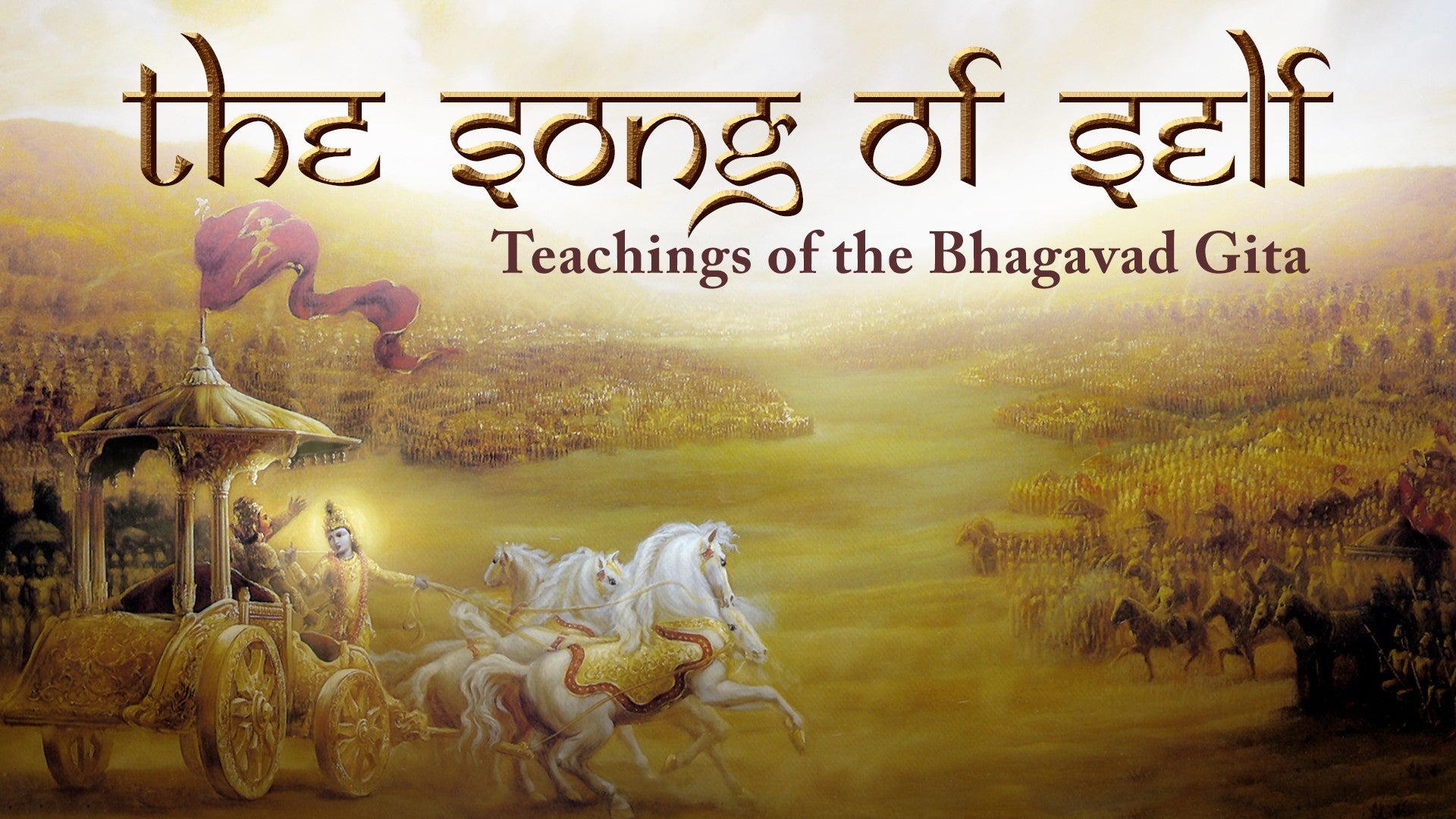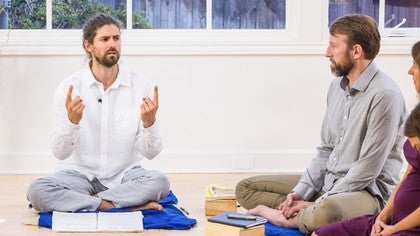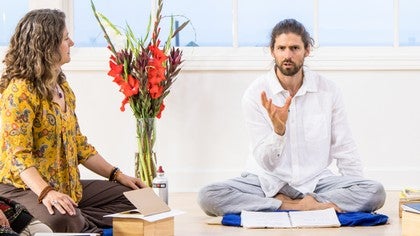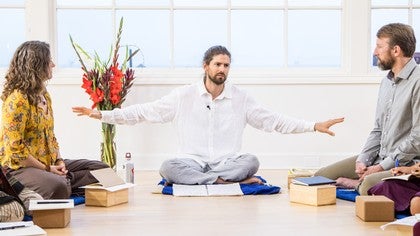Description
About This Video
Transcript
Read Full Transcript
So, with the 39th shloka, we've really come to the end of a section of the second chapter. The sankha section, in which Krishna lays down the kind of theoretical underpinnings of his position or what he's advocating, is complete. And now he's going to shift into a more, into the yoga section, the practical section, how to implement this in our activities. So he's already told Arjuna, never mind feeling overwhelmed, this is actually your lucky day. This is a great opportunity.
And he's also made it clear that not acting, sitting on the sidelines, isn't an option. Once you know what you've got to do, you've got to just get on with it. So then, what's the question? Well, how? Because this is where Krishna's going to continue with the fortieth verse.
But at the end of this 39th, he said, listen to this yoga now, once you understand that and you work with that, then you'll be able to act free from the binding influence of action. Karmabandam prahas, you see, acting in this way, you will be able to kind of throw up and become free from the binding influence of action, Karmabandana in the Sanskrit. Now, this idea of the binding influence of action is kind of a significant idea in yogic theory and practice. And so we're going to just take a little moment to just talk about what that means. So Karmabandana, bandha means binding, and karma literally means action.
Now, the word karma is one of those Sanskrit words that has, let's say, infiltrated other languages. It's coming to use in English and many other languages around the world. As long as people talk about good karma and bad karma, but what does karma literally mean? It just means action. And Krishna is very practical.
In this section of the Gita, he's going to tell us how to act, and he says he can't really escape action. The third chapter of the Bhagavad Gita, which is another of my absolute favorites, is all about how to make your actions yoga. It's the yoga of action, and he calls this karma yoga. How to make the things you do conducive to integration, conducive to yoga. But the idea is that basically everything that we do, it leaves an impression.
And so we get into this kind of cycle of desire, action, impression, desire, action, impression. Action. We do something, and we have an experience doing it, and that leaves an impression. And consequent upon that, we will have a desire for more of that type of impression, more of that type of experience, more of that type of action, or we'd prefer to avoid it. So for example, let's say you go to visit a town you've never visited before, and a friend recommends a particular restaurant, and you go, and you have a wonderful meal, you really enjoy it, and you recommend it to another friend who's visiting that same town another day.
And that friend goes with a big group, but your friend gets terribly sick that night. If that friend goes back to that town, will they want to go to that same restaurant? Probably not. Nobody else in the group got sick, so maybe it's not actually the restaurant at all. But once we've had a horrible experience in a certain place, we might choose never to return there.
We'll always think, oof, like an aversion will grow in us. Whereas if we go to the restaurant and we have a wonderful experience, if we visit that town again, even if we've heard of lots of other great restaurants in that town, we might think, oh, no, I don't know where I want to go. So the idea is that every experience, this is just a simple example, there's every experience that leaves an impression, and if our impressions feel favorable to us, it can make us want more. If our impressions don't make a good impression, it can make us want to try to avoid that. This is the basic idea.
It's pretty easy, yeah? But it gets a bit more complex because it's the idea that our impressions can actually act like a veil, and stop, they can colour our experience, and stop us then actually meeting life fully as it is. So it can kind of almost steal away our capacity to truly experience fully whatever's happening in the present moment. So to illustrate this a little bit more clearly, I'd like to give an example in which I reference my mother, who departed this worldly realm a couple of years ago. And my mother and father, since I was a small boy, I remember they always grew some vegetables in the garden where they lived in England.
And we moved house when I was seven, so this episode happened when I was about five years old. And my mum and dad got very good at growing what we call in England broad beans. In some other, like in America, I think you call them fava beans, those nice big beans in that very thick pod. So for the amateur gardener, they're a great thing to grow because you don't need to pay so much attention to them, you've got such a thick pod that the bugs can't really interfere with them very easily. So you can just plant them and leave them, and a few months later have this beautiful harvest of these wonderfully tasty broad beans.
My mum and dad got very confident with broad beans and courgettes, courgettes which often in the US are referred to as zucchini. Other things like this, gooseberries, rhubarb, flowers also. My dad likes growing dahlias. But one year they heard that this kale, this kale, this curly kale, was quite an easy thing to grow. So they tried growing curly kale.
And it came to that point in the early summer when the kale was ready to harvest. And my mother said to my dad, they're making dinner, oh that kale looks ready, go and pick some for me. So my dad goes out into the garden and ends down, picks a big bunch, a big head of kale, puts it on the kitchen table and then goes off to do something else. A couple of minutes later my mother goes to the kitchen table and the roots of the kale are, you know, there's still that fresh, dark, moist British soil hanging from the roots of the kale. But that's not the only other thing that is there on the kitchen table.
My mother, well she kind of shouts out in disgust because the kale is full of this particular bog or inset that we call earwigs in England. They're quite big and not what you'd like to put on your dinner plate, let's say. Not for, no, certainly not for my mother anyway. So she goes to my dad, she's like, it's terrible, it's full of earwigs, put it on the compost heap. And she says, I think the whole patch is full of them, oh, just put it on the compost heap.
And guess what, they never grew kale again. My mother made the connection that kale and earwigs are basically universally concomitant. They always go together, he always finds them. So next year when they decide what to plant, yes, gooseberries, definitely rhubarb, oh yes, very successful, broad beans, of course. But their experiment, not kale.
About 20 years later, at least, I was at that time working in Thailand, teaching at university in Bangkok. And I had a colleague called Ajahn Tam, who was a dance teacher, and he had previously worked as a professional dancer in England, and my mum really liked dance as well. And I'd done a lot of work with Tam, editing a book that he'd been writing. And he knew my parents were going to come and visit, and he was very excited to meet them because he had a lot of fond memories of his time in England. He hadn't been back for so long.
So sure enough, when my parents visited Thailand, my friend Ajahn Tam and his family, they invited us out for dinner. And we go to this lovely Thai restaurant, like very homely style, and the waiters come out and they present us the menu, and the menu's in Thai. And there was an English menu, but at the moment I'd say, no, no, no, you just choose. You know what's the nice things. So we choose selection.
And one particularly agreeable item, although there are many, many very agreeable items on a typical Thai menu, are the fresh greens that they stir fry. So I said to my mum, my mum likes fresh vegetables, so I said, oh, we should get some of these fresh greens. This one here, this pakkanathai deng, is particularly delicious. So what is that? It says, oh, it's kale.
Oh, don't want kale. That's full of earwigs. It says to my mum, so I'm like, no, mum, it's a different variety to the one you tried to grow all those years ago in English. No, no, kale, don't want that. What's this other one?
I said, oh, I don't know. Well, yeah, there are. And then my friend can see that my mum is not going to be half-willed kale. So we discuss what's the other best option. But I know that my mum's really going to love that.
And she doesn't speak Thai. So when the waiter comes, I place the order for stir-fried kale. It comes out. I serve my mother. Oh, this is really very good, isn't it?
What do you say they call this? I don't know what it is in English, mum. It's like one of these water vegetables. They don't grow in England. I don't know what it's called.
Well, remember what it is, because next time we eat at a restaurant, yeah, I'll have more of this. A couple of days go by, and we're eating at another restaurant. And my mum says, oh, do they have that green that we had the other day? And they do. And I order it.
But in this restaurant, the waiter, he speaks very good English. And you can tell that my mother and father don't speak Thai. And so as he goes through, it was a very good waiter, very conscientious, very thorough. And when he goes through our order before he takes off to the kitchen, he says, in English. So he got this.
And he got the stir-fried kale. Kale. And I said, oh, sorry, mum, but the other night, the one you really liked, that was kale. Really? Yes.
Oh, well. Maybe I have to revise my opinions. Yeah, it's a different variety to the one you get in England. They grow in different conditions. No earwigs here.
But maybe we can all relate to this story, because in my mum's situation, she had a bad experience that had basically put a barrier up in her mind to anything to do with kale. And so she kind of stopped herself. She closed kale off. And this is how the binding influence of action works. Again, it's like just a silly example.
But I think it illustrates this idea that we have an impression based on a previous action or experience. And this creates a desire for more or less a longing for or an aversion that actually colors our interactions, actually kind of tints the way we see the world and stops us meeting things as they are, and sometimes actually stops us meeting things altogether because we choose to push things away or we choose to just go for things we already know and so turn a blind eye to some of their opportunities. This is a brief kind of resume of the binding influence of action. We do something. It leaves an impression.
And based on that, we're bound. We want more. We want less. And when we're in a similar situation, we don't actually make a free choice. We just act based on the conditioning that ensues from that impression from that previous experience.
So in yoga is the idea that a lot of the time we're kind of the prisoners of our past conditionings. And the practice of yoga is how we can actually learn to be in the world, but not be a prisoner of our past experiences, but meet each moment as it is fully so we can come to completion in each and every moment without being bound. And so this is what Christian is going to tell us how to do.







You need to be a subscriber to post a comment.
Please Log In or Create an Account to start your free trial.